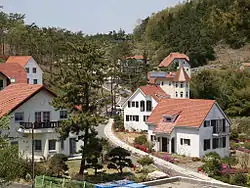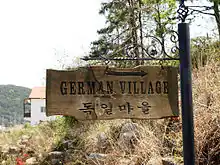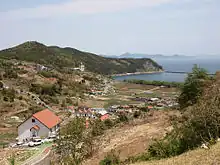Namhae German Village | |
|---|---|
Neighborhood | |
 Part of the village (2011) | |
| Coordinates: 34°47′56″N 128°02′24″E / 34.79889°N 128.04000°E | |
| Country | South Korea |
| Province | South Gyeongsang Province |
| County | Namhae County |
| Myeon | Samdong |
| Established | 2001 |
| Website | 남해독일마을 |
Namhae German Village (Korean: 남해 독일마을, German: Deutsches Dorf Namhae) is an ethnic enclave located in Samdong-myeon, Namhae County, South Gyeongsang Province, South Korea. It is populated by both Germans in South Korea and South Koreans who worked in Germany as migrant workers during the 1960s and 1970s.
The village has become a tourist destination, and hosts a significant Oktoberfest event that draws tens of thousands of people per year.
Background
In the 1960s and 1970s, South Korea sent thousands of its citizens to work as nurses and miners in West Germany. A number of the workers stayed there upon the conclusion of their contract. South Korea's population is now aging, which has also notably affected Namhae County. In 2001, the county constructed this village and offered significant subsidies to any South Korean who lived in Germany for at least 20 years.[1][2] In total, the project costed around US$7.5 million.[1]

Suk Sook-ja, who went to Leichlingen in 1973 and stayed in Germany for 30 years, played a significant role in the development of the village. She had been planning to return to South Korea when her German husband reached retirement age. In 1999, the Namhae government toured major German cities and held presentations. She decided to move to Namhae, and bring parts of German culture with her. She consulted the Namhae government and became the first returnee to the village.[3] The village began with five houses.[3]
Description

Suk has either led or helped develop several programs for the village. She ran German language classes from 2006 to 2009, and created the first village Oktoberfest in 2010. The event was a success, and drew 10,000 visitors. By 2020, the event drew around 100,000 visitors a year.[3]
The village had 43 houses with 60 residents in 2020.[3] A number of residents do not live in the homes here year round, and use them as vacation homes for when they visit South Korea, while renting out the home for the rest of the year.[4][1] Also, many of the residents are themselves elderly. This has drawn skepticism that the community will survive in the long term.[1][3]
In 2014, the village built a Namhae Germany Exhibition Hall for community activities. The village also has a agricultural cooperative and sells German snacks to visitors.[3]
The village offers tours for tourists.[3] There are a number of other tourist attractions nearby, including the Buddhist temple Boriamsa and the scenic terraced farming town Daraengi Village.[3]
One resident reported in 2021 that the South Korean government did not deliver on several promises related to the village. A hospital was promised for the area but never constructed. Water pipes were constructed around 40 cm (16 in) below the ground, meaning that when the weather was warm only hot water would come out of the pipes.[5]
Gallery
.jpg.webp) View from the sea (2015)
View from the sea (2015).jpg.webp) View of the village (2015)
View of the village (2015).jpg.webp) Village square (2015)
Village square (2015).jpg.webp) Beer hall (2015)
Beer hall (2015).jpg.webp) Museum (2015)
Museum (2015)
See also
- Seorae Village – a French ethnic enclave in Seoul
References
- 1 2 3 4 Onishi, Norimitsu (2005-08-09). "In a Corner of South Korea, a Taste of German Living". The New York Times. ISSN 0362-4331. Retrieved 2023-10-13.
- ↑ Herskovitz, Jon (2006-04-16). "The Comforts of Germany on a South Korean Island". Washington Post. ISSN 0190-8286. Retrieved 2023-10-13.
- 1 2 3 4 5 6 7 8 Song, Ji-yoo (2020-07-30). "A Returned Korean-German Nurse, Who Impressed Germany, Now Cultivates a German Village in Korea | Korea Tour Guide for travelers". 디그램 여행 가이드. Retrieved 2023-10-13.
- ↑ "German Village (독일마을) : VISITKOREA". German Village (독일마을). Retrieved 2023-10-13.
- ↑ The truth behind Little Germany in Korea (Ep. 11), August 25, 2021, retrieved 2023-11-20
External links
- The truth behind Little Germany in Korea (Ep. 11) on YouTube – A documentary about the village (in English)